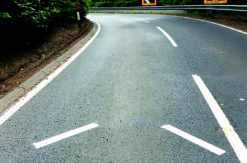
An innovative motorcycle safety project in Scotland that used road markings to guide bikers into taking safer lines into bends has been awarded a prestigious road safety award.
Project PRIME – it stands for Perceptual Rider Information for Maximising Expertise and Enjoyment (PRIMEs) – has been given a Prince Michael International Road Safety Award, which is presented to organisations in recognition of their outstanding contribution to improving road safety.
Transport Scotland worked with the Road Safety Trust, BEAR Scotland and globally recognised expert Professor Alex Stedmon to create 22 trial sites across Scotland where new road markings were installed to improve the riding behaviour of motorcyclists taking left hand bends.
The project took a unique approach to casualty reduction that sets out to ‘prime’ rider behaviour by developing unique road markings that guide bikers into taking up the best position on the road as they approach a potential hazard.
The PRIME road markings are designed as a set of three ‘gateways’ so that motorcyclists might ride ‘through the gap’ to put them in the correct position for the bend and allow them to adjust their speed and braking prior to the bend.
The markings also assist motorcyclists where it is important that:
- speed is suitable for the conditions
- lane position is optimised for negotiating the bend
- motorcyclists do not have to initiate braking whilst negotiating the bend
Video footage of over 32,000 motorcycles using the markings was manually assessed and led to:
- A significant reduction in speed.
- A significant improvement in road position both on the approach and apex of the bend.
- A significant improvement in braking behaviour.
- No motorcycle injury collisions at any of the previously identified accident cluster sites where PRIME markings have been deployed.
The project lead, Professor Alex Stedmon, said:
“It is an incredible honour to receive this award for Project PRIME, especially with its focus on motorcyclists who are one of the most vulnerable types of road user.
“Throughout Project PRIME we have involved motorcyclists in the development of this casualty reduction initiative, so that the road markings are something they will accept and use. It has been developed for motorcyclists by motorcyclists.
“As a psychologist and also a keen motorcyclist, I am very proud to have led the research on this work. While solution might appear simple, the science behind it is complex. However, it would not have been possible without the support and commitment of the Road Safety Trust, Transport Scotland, BEAR Scotland and Open Road Simulation.”
Ruth Purdie OBE, chief executive of The Road Safety Trust, said:
“The PRIME project represents a new and innovative approach to motorcycle casualty reduction. With data from tens of thousands of motorcyclists, the results show that PRIMEs have a significant positive effect on rider behaviour.”
Ian Stewart from BEAR Scotland said:
“I am proud of BEAR Scotland’s role as a key partner in Project PRIME. Our engineers have been involved with this real-world research project from its conception and their expertise enabled it to be carried out on Scottish roads. This work has the potential to be a low cost, highly beneficial road safety improvement scheme that will help reduce motorcycle accidents on our roads for years to come.”
You can find out more about the project at:
https://www.roadsafetytrust.org.uk/funded-projects/transport-scotland
Photo credit: Professor Alex Stedman


